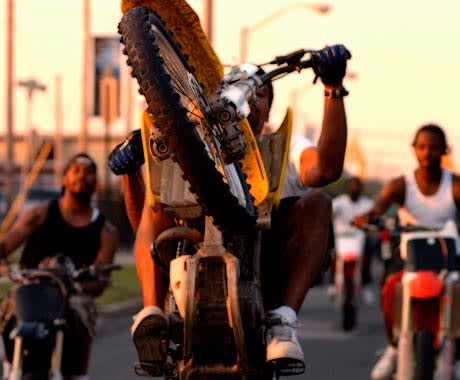Growing up in an impoverished neighbourhood in West Baltimore where drugs and gangs regularly threaten to derail young lives, there's a dire need to find some outlet to provide a temporary respite from the claustrophobic surroundings. For the pubescent Pug, who was followed by cameras for three years in his attempt to join the titular group for the energetic and immersive documentary 12 O'Clock Boys, this means riding dirt bikes and learning how to pop a wheelie.
From when the audience is first introduced to Pug, he is already obsessed with a subculture that illegally rides dirt bikes through Baltimore streets on Sundays while evading cops and mugging for videos set to hip-hop music and uploaded to YouTube. His mother, Coco, who appears perpetually overwhelmed by a house teeming with kids, is unable to keep Pug from leaving their porch and becoming more and more entrenched in a world that is not without its pitfalls.
Though he also possesses a keen interest in animals and has vague plans (and strict orders from his mother) to become a veterinarian, Pug is frequently absent from school or suspended for fighting. He also deals with anger issues that are exacerbated by the lack of a father and the death of an older brother from an asthma attack over whom he grieves. As he begins to make friends within the community and learns how to expertly handle a bike, he becomes part of a group of people united by the same passion.
The slice-of-life approach and candid access allow the opportunity to see not only what kind of oppressive environment Pug longs to escape, but also glimpses into the high-octane world to which he yearns to belong. While the many slow-motion shots of riders pointing their front tires to the sky like hands signalling noon or midnight on a clock skirt the edge of glorifying an undeniably dangerous pastime, they do help capture the essence of what makes the activity so exciting from Pug's perspective.
The contentious attitude riders have towards the police (who have a policy of not chasing dirt bikes for safety reasons) is explored in some depth, but there are unexamined issues of arrests and injuries that might have made for a more even-handed film. Lingering questions also remain about how Coco is able to afford to bankroll Pug's expensive pastime, especially when she is forced to buy him another bike after his is stolen.
This hardly detracts, however, from the prevailing message that being young comes with a deep need to find somewhere to belong and that kids are going to find a way to fill that void one way or another.
(VSC)From when the audience is first introduced to Pug, he is already obsessed with a subculture that illegally rides dirt bikes through Baltimore streets on Sundays while evading cops and mugging for videos set to hip-hop music and uploaded to YouTube. His mother, Coco, who appears perpetually overwhelmed by a house teeming with kids, is unable to keep Pug from leaving their porch and becoming more and more entrenched in a world that is not without its pitfalls.
Though he also possesses a keen interest in animals and has vague plans (and strict orders from his mother) to become a veterinarian, Pug is frequently absent from school or suspended for fighting. He also deals with anger issues that are exacerbated by the lack of a father and the death of an older brother from an asthma attack over whom he grieves. As he begins to make friends within the community and learns how to expertly handle a bike, he becomes part of a group of people united by the same passion.
The slice-of-life approach and candid access allow the opportunity to see not only what kind of oppressive environment Pug longs to escape, but also glimpses into the high-octane world to which he yearns to belong. While the many slow-motion shots of riders pointing their front tires to the sky like hands signalling noon or midnight on a clock skirt the edge of glorifying an undeniably dangerous pastime, they do help capture the essence of what makes the activity so exciting from Pug's perspective.
The contentious attitude riders have towards the police (who have a policy of not chasing dirt bikes for safety reasons) is explored in some depth, but there are unexamined issues of arrests and injuries that might have made for a more even-handed film. Lingering questions also remain about how Coco is able to afford to bankroll Pug's expensive pastime, especially when she is forced to buy him another bike after his is stolen.
This hardly detracts, however, from the prevailing message that being young comes with a deep need to find somewhere to belong and that kids are going to find a way to fill that void one way or another.




